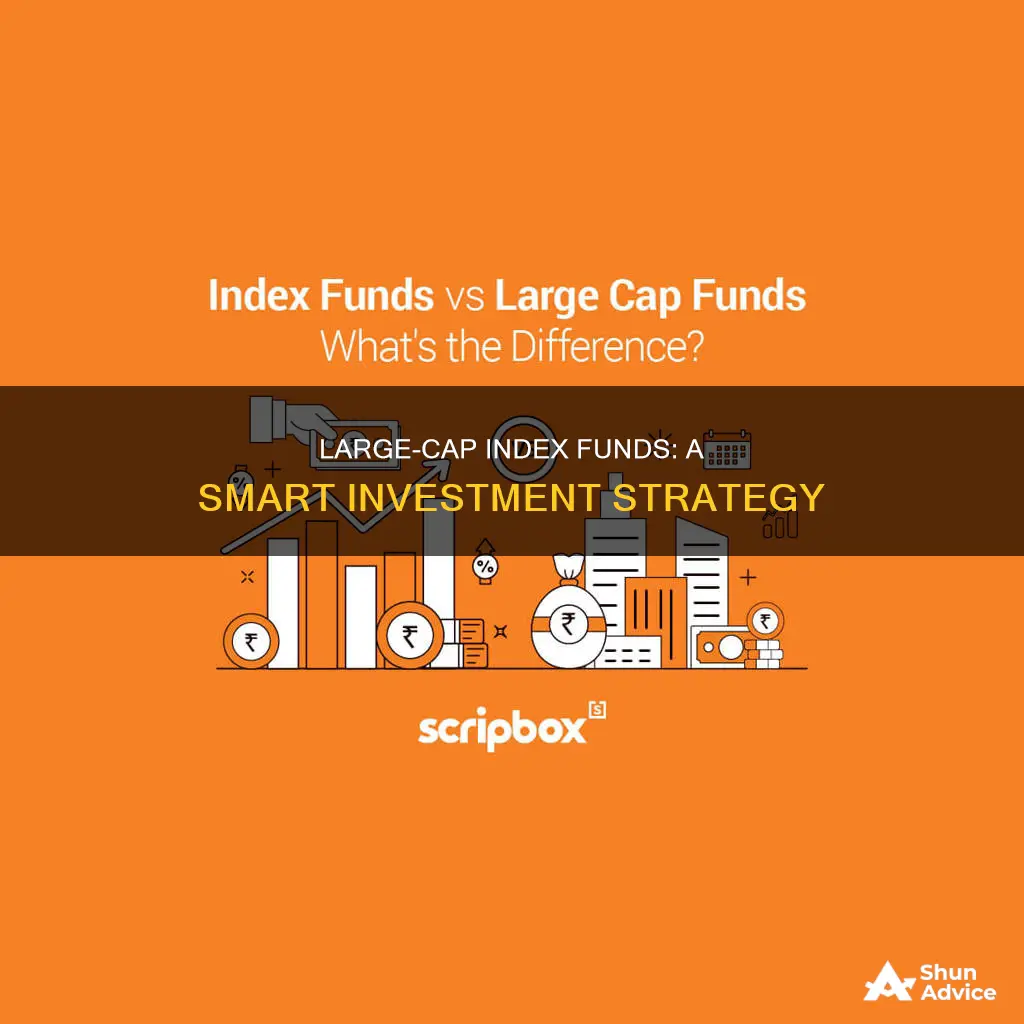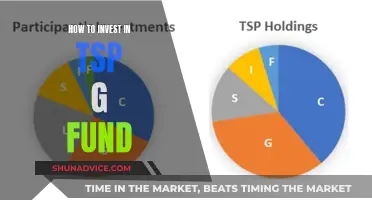
Large-cap index funds are a great way to invest in the stock market with relatively lower risk and volatility. These funds track a preset basket of large-cap stocks, aiming to replicate the performance of a specific index, such as the S&P 500 or Dow Jones Industrial Average. By investing in large-cap index funds, you can gain exposure to a diverse range of well-established companies, potentially reducing the risk associated with individual stocks.
Large-cap index funds are typically passively managed, meaning they aim to mirror the performance of the underlying index without active management. This passive management style contributes to their low cost, making them an attractive option for investors. Additionally, large-cap stocks tend to provide decent dividends and growth potential, making them a popular choice for those seeking stable investments.
When investing in large-cap index funds, it's important to consider factors such as the fund's expense ratio, long-term performance, and the index it tracks. Diversification is also key, as investing in a variety of large-cap funds can help further reduce risk.
Some popular large-cap index funds include the Fidelity ZERO Large Cap Index Fund, Vanguard S&P 500 ETF, and the SPDR S&P 500 ETF Trust. These funds offer low expense ratios and have delivered solid returns over the years.
Overall, large-cap index funds provide a relatively safe and low-cost option for investors seeking exposure to the stock market. By investing in these funds, you can gain access to a diverse range of established companies and potentially benefit from their growth and dividend payouts.
| Characteristics | Values |
|---|---|
| Investment funds | Mutual funds or exchange-traded funds (ETFs) |
| Investment strategy | Passive management strategy |
| Investment aim | To mirror the performance of an existing stock market index |
| Investment risk | Less risky than individual stocks |
| Investment costs | Lower fees than actively managed funds |
| Investment performance | Often perform better than actively managed funds over the long term |
| Investment suitability | Good for beginners and retirement investors |
What You'll Learn

Large-cap index funds are a safe investment option
Large-cap index funds provide immediate diversification as they allow investors to own a wide variety of stocks across different sectors and industries with a single purchase. This diversification reduces the risk associated with investing in individual stocks, as the performance of an index fund is less volatile and not tied to the outcome of a few companies. While it is theoretically possible for an index fund to lose everything, it is highly unlikely as all the stocks in the index would have to drop to zero.
Additionally, large-cap index funds have delivered solid long-term returns. For example, the S&P 500 has historically returned about 10% annually. While index funds fluctuate with the market, investing for the long term allows investors to benefit from compound growth as the economy expands and corporate profits increase.
Furthermore, large-cap index funds are associated with lower costs, which is a crucial factor in total investment returns. The expense ratios of index funds are typically low, and in some cases, like the Fidelity ZERO Large Cap Index Fund, there is no expense ratio at all. By contrast, mutual funds that are not index funds often charge higher fees to cover the expenses of their investment management teams.
When investing in large-cap index funds, it is essential to consider factors such as the fund's expenses, taxes, investment minimums, long-run performance, and trading costs. It is also important to remember that while index funds are safer than individual stocks, they can still underperform and lose money for years, depending on the specific investments they hold.
In conclusion, large-cap index funds are a safe investment option due to their diversification benefits, lower risk, and attractive long-term returns. They are a suitable choice for investors seeking a broadly diversified, low-cost investment vehicle with the potential for solid returns over time.
Invest HSA Funds: Long-Term Benefits, Tax-Free Returns
You may want to see also

They offer low fees, growth potential, and less volatility
Large-cap index funds are one of the safest investments offered by the stock market. They are known for providing decent dividends and growth potential, while also reducing volatility.
When it comes to fees, large-cap index funds are known for being low-cost investments. Vanguard and Fidelity, for example, offer a wide variety of low-fee growth, value, and blend large-cap index funds. In fact, Fidelity pioneered the zero expense ratio index fund. Passively managed funds, like large-cap index funds, are often boosted by their low costs, allowing them to beat their actively managed counterparts.
Large-cap index funds also offer growth potential. For example, the Vanguard Dividend Appreciation Index Admiral (VDADX) fund has a history of rising dividends and a robust average earnings growth rate. The fund has roughly 300 holdings, offering broad diversification and a mix of reasonably valued growth and value companies.
Finally, large-cap index funds are known for their low volatility. The Vanguard 500 Index Fund Admiral (VFIAX), for instance, has a strong weighting in the IT sector, which can be a common risk in this type of fund. However, the fund also has holdings in healthcare, financials, and consumer discretionary, which helps to balance the portfolio and provide lower volatility than the category average.
Corporations' Hesitance Towards Mutual Funds: Exploring the Why
You may want to see also

You can buy large-cap index funds from Vanguard and Fidelity
Vanguard Large-Cap Index Funds
Vanguard has a range of large-cap index funds, including:
- Vanguard Developed Markets Index Admiral (VTMGX): This fund invests in international large-cap companies, providing global diversification. It has a higher dividend yield than its peers and a lower price-earnings ratio, making the holdings look more attractive than larger U.S. stocks.
- Vanguard Dividend Appreciation Index Admiral (VDADX): This fund focuses on quality holdings with a history of rising dividends and a robust average earnings growth rate. It offers broad diversification and a mix of growth and value companies.
- Vanguard 500 Index Fund Admiral (VFIAX): This fund tracks the S&P 500, one of the most widely followed stock market indices, and is considered a core fund for investors.
Fidelity Large-Cap Index Funds
Fidelity also offers a variety of large-cap index funds, such as:
- Fidelity ZERO Large Cap Index (FNILX): This fund offers broad diversification and exposure to large-cap U.S. stocks with a zero expense ratio, meaning there are no fees associated with investing in this fund.
- Fidelity U.S. Sustainability Index Fund (FITLX): This fund focuses on ESG investing, considering environmental, social, and governance factors. It has outperformed the large-cap blend category's average annual returns over the past one, two, three, and five years.
- Fidelity Large Cap Value Enhanced Index Fund (FLVEX): While there is limited information available specifically on this fund, Fidelity offers a range of large-cap funds, and this fund has been listed as one of the best large-cap index funds by Forbes.
Factors to Consider
When deciding between Vanguard and Fidelity large-cap index funds, it is essential to consider factors such as the fund's investment objective, strategy, and index tracked. Additionally, look at the fund's performance, fees, and investment minimums. Both companies offer a range of funds with different characteristics, so it is crucial to choose the one that aligns with your investment goals and risk tolerance. Additionally, it is worth noting that Fidelity claims to have lower expenses than all comparable funds at Vanguard.
Unlocking Absolute Return Funds: Powering Your Investment Portfolio
You may want to see also

They are passively managed funds with low costs
Index funds are passively managed, meaning they don't require active management. They are designed to mirror the performance of a specific market index, such as the S&P 500, and don't require fund managers to make decisions about which stocks to buy or sell. This passive management style results in lower costs for investors.
Index funds are a low-cost investment option, as they don't require active management and have lower fees compared to actively managed funds. The expense ratio, which is the cost subtracted from each shareholder's returns as a percentage of their investment, tends to be lower for index funds. Actively managed funds, on the other hand, tend to have higher fees due to the work involved in researching and selecting investments.
Large-cap index funds, in particular, offer exposure to the top 100 stocks, providing investors with a diversified portfolio of well-established, large companies. These large-cap stocks also tend to provide decent dividends and growth potential, along with lower volatility compared to other areas of the market.
When investing in large-cap index funds, it's important to consider the fund's expense ratio and ensure that it is tracking a broad market index. Additionally, investors should be aware of the potential tax implications, as owning the fund may trigger capital gains taxes if held outside of tax-advantaged accounts.
Overall, large-cap index funds offer a passively managed, low-cost investment option for those seeking exposure to the top stocks in the market.
How to Choose a Qualified Opportunity Fund for Investing
You may want to see also

Large-cap index funds are a good option for core holdings in a portfolio
Another advantage of large-cap index funds is their low cost. These funds are passively managed, which means they have lower fees than actively managed funds. In some cases, such as with the Fidelity ZERO Large Cap Index Fund, there is no expense ratio at all. This means that investors can access a diversified portfolio of large-cap stocks at a low cost, making large-cap index funds a good option for core holdings in a portfolio.
When considering which large-cap index fund to invest in, it is important to research and analyze the different funds available. Factors to consider include the geographic location of the investments, the market sector, and the investment strategy. It is also important to compare the expenses of each fund, as well as the long-term performance and investment minimums.
Some of the top large-cap index funds to consider include the Fidelity ZERO Large Cap Index Fund, the Vanguard S&P 500 ETF, and the SPDR S&P 500 ETF Trust. These funds offer broad diversification, low costs, and strong long-term performance, making them good options for core holdings in a portfolio.
A Beginner's Guide to Gold Exchange-Traded Funds
You may want to see also







